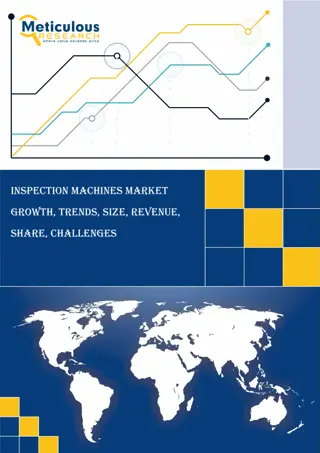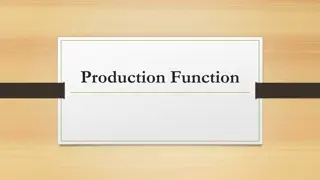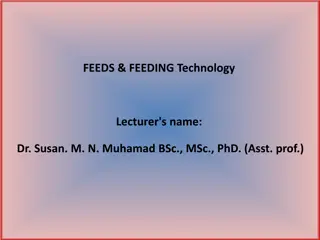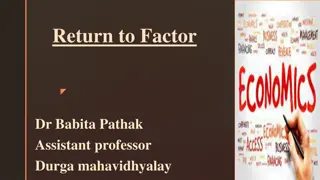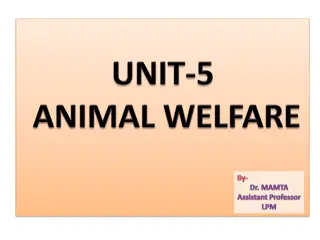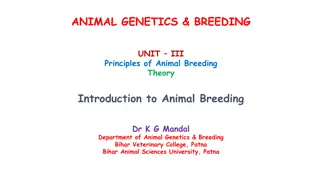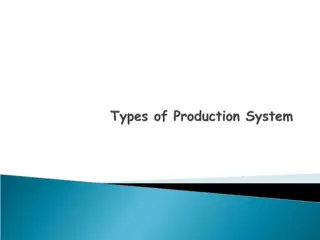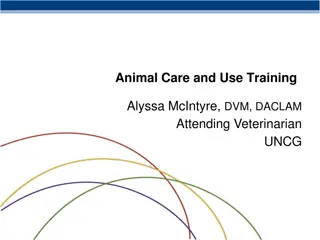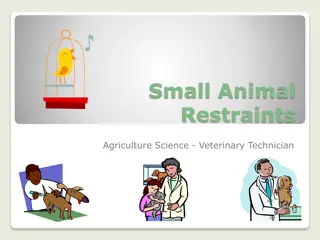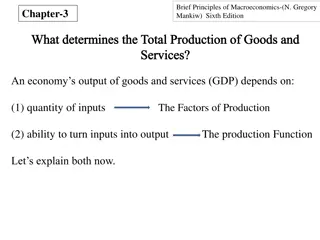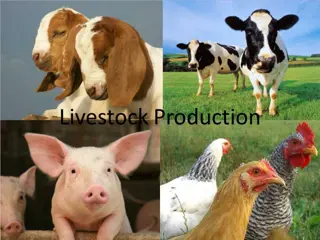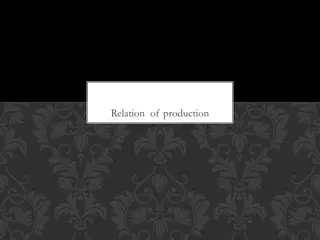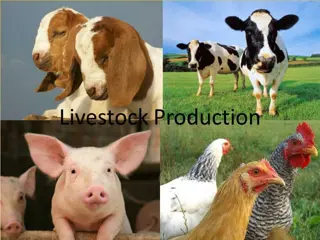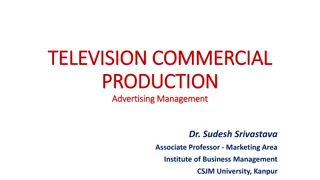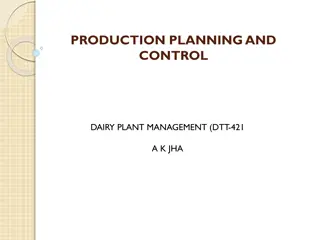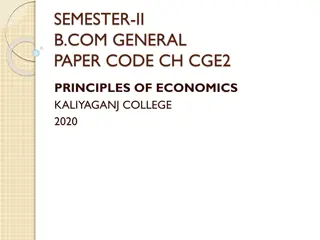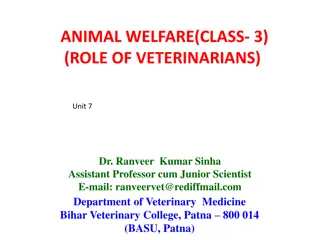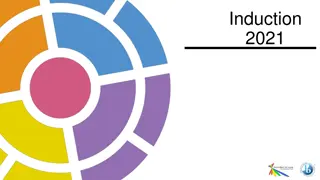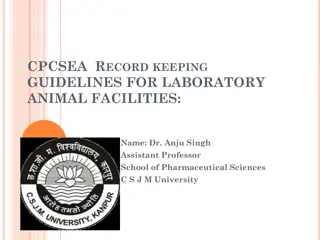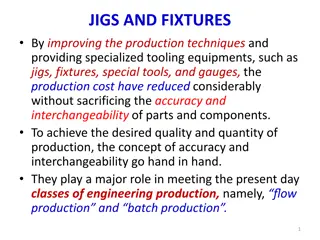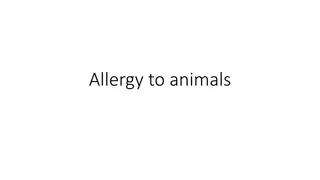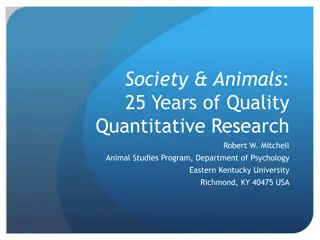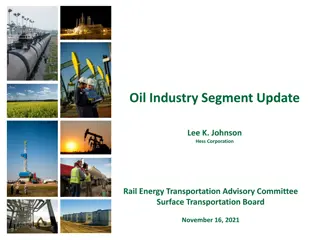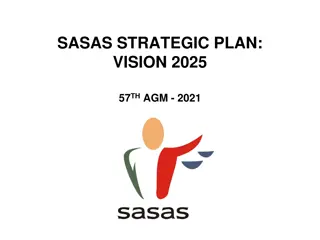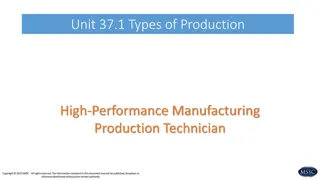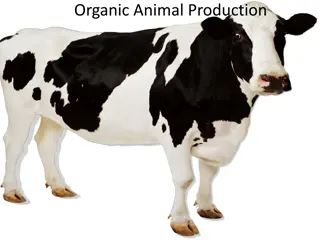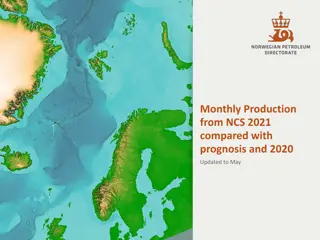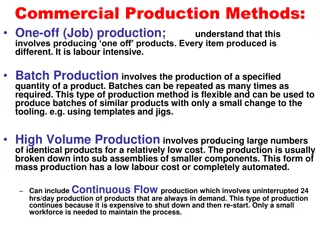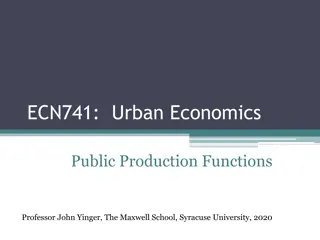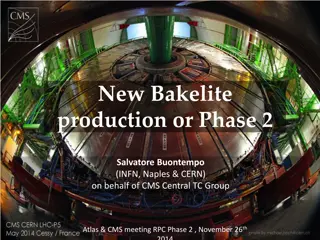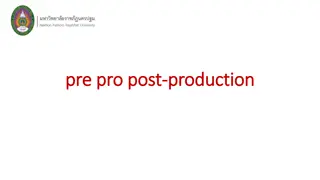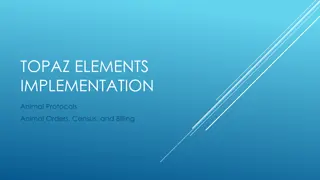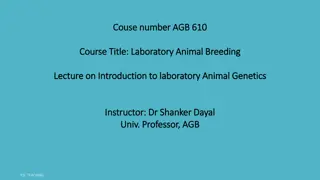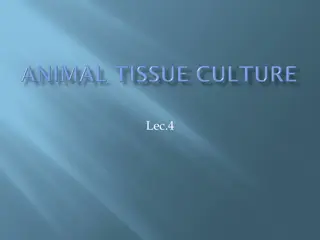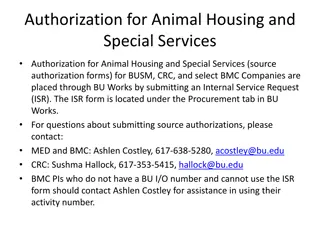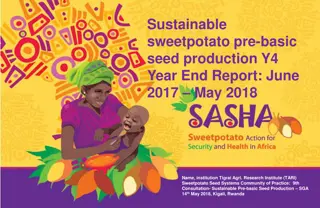History and Educational Programs of DEU Lab Animal Science Department
Established in 2004, the Department of Laboratory Animal Science at Dokuz Eylul University Institute of Health Sciences offers cutting-edge education focusing on animal welfare and ethical practices in scientific research. The department upholds the 3R Principle—Reduction, Refinement, Replacement�
0 views • 9 slides
Recycling of Animal Washings and Waste in Fodder Production
Animal waste, including excrement and washings, can be recycled to enhance fodder production. By using animal waste as organic mulch or pesticides, farmers can improve soil fertility and crop yield in sustainable agriculture practices. This method also supports organic farming, with benefits for bot
0 views • 14 slides
Responsibilities of Facility Animal Care Committee at McGill University
The Facility Animal Care Committee (FACC) at McGill University oversees animal activities, ensures ethical treatment of animals, and adheres to guidelines from organizations such as the Canadian Council on Animal Care (CCAC). Responsibilities include continual oversight of animals, approving care pr
1 views • 13 slides
Feed Software Market is expected to reach $456.1 million by 2030
The growth of this market is attributed to the adoption of digital technologies and automation in the animal feed industry, the growing animal population, increasing demand for healthy animal-based food products, increasing animal health expenditure and pet insurance, and the growing need to reduce
0 views • 4 slides
Understanding the Production Function in Economics
The production function is a vital mathematical equation that determines the relationship between factors of production and the quantity of output. This function plays a crucial role in optimizing production efficiency by assisting in decision-making related to input levels, output quantities, and c
0 views • 9 slides
Understanding Feeds and Feeding Technology in Animal Production
Feed plays a crucial role in animal production systems, constituting a significant portion of production costs. Dr. Susan M. N. Muhamad, a dedicated lecturer, enlightens students on feedstuffs classification, nutritive characteristics, and practical feeding strategies. This course delves into the im
3 views • 23 slides
Understanding the Concept of Return to Factor in Production Economics
Return to Factor is a key concept in production economics that explains the relationship between variable inputs like labor and total production output. The concept is based on the three stages of production - increasing returns, diminishing returns, and negative returns. By analyzing the behavior o
0 views • 7 slides
Animal Welfare and Ethics: Standards and Regulations in India
The content covers a wide range of topics related to animal welfare, ethics, and laws in India. It delves into the definition of animal welfare, the role of veterinarians, animal welfare organizations, regulations like the Prevention of Cruelty to Animals Act, and protection of wildlife, working ani
0 views • 15 slides
Principles of Animal Breeding: Introduction and Historical Perspective
This unit covers the introduction to animal breeding, the application of genetics principles in breeding, historical perspectives including the work of Robert Bakewell, and key events in animal breeding evolution. Topics include breeding systems, importance of animal breeding, and notable figures in
1 views • 12 slides
Understanding Types of Production Systems: Intermittent vs. Continuous
Types of production systems are categorized into Intermittent Production System and Continuous Production System. In Intermittent Production, goods are produced based on customer orders in a flexible and non-continuous manner, allowing for a variety of products. Examples include goldsmiths making or
10 views • 17 slides
Importance of Training in Animal Care and Use for Research
Training in animal care and use is essential to ensure humane and appropriate treatment of research animals, promote regulatory compliance, and uphold high standards of science and animal well-being. The presentation covers the necessity of training, goals including reviewing animal use and identify
0 views • 53 slides
Small Animal Restraints and Safe Handling Practices in Veterinary Technology
Importance of safe practice when working with small animals includes preventing harm, reducing injury, and minimizing stress. Proper animal handling methods and tools are crucial for the safety of both animals and handlers. Common methods of handling different species, demonstrating appropriate anim
1 views • 22 slides
Determinants of Total Production in Macroeconomics
An economy's total production of goods and services (GDP) is influenced by the quantity of inputs, known as the Factors of Production, and the ability to transform inputs into output through the production function. The key factors of production are capital and labor, and the production function det
0 views • 37 slides
Overview of Poultry Production: Eggs, Meat, and Systems
Poultry production encompasses the raising of domesticated fowl such as chickens, turkeys, ducks, and geese for meat and eggs. This includes caged and cage-free egg production systems, as well as meat production practices for broilers and other poultry. The industry faces scrutiny from animal rights
1 views • 21 slides
Understanding the Difference: Animal Rights vs. Animal Welfare
Explore the nuanced distinction between animal rights and animal welfare, delving into the ethical considerations, philosophies, and advocacy efforts surrounding these concepts. Discover how animal rights proponents emphasize the equal rights of animals, while animal welfare focuses on humane treatm
0 views • 36 slides
Understanding Relations of Production in Society
People's need for survival drives them to engage in material production, forming the foundation of human existence. According to thinkers like Karl Marx, the interplay between economic production and social relationships shapes society's structure. The forces of production encompass technological ad
1 views • 7 slides
Overview of Livestock Production: Cattle, Sheep, and Goat Breeds
Explore the diverse world of livestock production, including cattle ranching, dairy farming, hog and pig farming, poultry and egg production, and animal aquaculture. Delve into the specifics of sheep and goat production, from breeds and production systems to management practices, breeding techniques
1 views • 43 slides
Understanding Television Commercial Production Process
Television commercials (TVCs) play a crucial role in advertising, promoting products, services, and ideas to a wide audience through television broadcast. This comprehensive guide covers the definition of TVCs, their objectives, steps in the production process (pre-production, production, post-produ
3 views • 34 slides
Introduction to Production Planning and Control in Dairy Plant Management
Production planning and control in dairy plant management involve the strategic processes of production, planning, and control to ensure efficient manufacturing operations. Planning is crucial in determining what, how, how much, and where to produce, while control involves monitoring and adjusting p
2 views • 22 slides
Principles of Economics: Theory of Production and Production Functions
Explore the Principles of Economics with a focus on the Theory of Production, including the Production Function which illustrates the relationship between inputs and outputs. Learn about short run versus long run production, factors of production, and the Law of Variable Proportions. Gain insights i
0 views • 17 slides
Role of Veterinarians in Animal Welfare
Veterinarians, especially with the increasing number of female professionals in the field, play a crucial role in promoting animal welfare through daily practices, advocacy, education, and research. They are involved in various sectors like biomedical, wildlife, and farm animal research, as well as
3 views • 10 slides
Exploring Animal Management and Sociology in Education
Discover the intersection of animal management and sociology in education through a comprehensive course structure that covers topics ranging from animal welfare and ethics to practical husbandry. Dive into the significance of animal care in the UK economy and learn about various career paths in thi
2 views • 19 slides
Laboratory Animal Facilities Record-keeping Guidelines
Guidelines for maintaining records in laboratory animal facilities include provisions for animal housing, staff records, health monitoring, and standard operating procedures. Compliance with CPCSEA regulations ensures ethical review procedures for animal research proposals. Focus is on providing a s
6 views • 11 slides
Understanding the Importance of Jigs and Fixtures in Production Techniques
Jigs, fixtures, and specialized tooling equipment play a crucial role in reducing production costs while maintaining accuracy and interchangeability of parts. They are essential in job production, batch production, flow production, and mass production. By ensuring accuracy, interchangeability, and e
2 views • 19 slides
Understanding Allergies to Animals and Living Organisms
Allergies to animals and living organisms are a result of specific immune processes triggered by allergenic substances like proteins and peptides. This allergic response can be caused by various animal proteins such as dog allergens Can f.1, Can f.2, and Can f.3, and cat allergen Fel d1. The represe
1 views • 10 slides
Exploring Human-Animal Interactions through 25 Years of Quality Research
Delve into the interdisciplinary realm of human-animal interactions with a focus on social sciences and quantitative research. Discover key themes such as social psychology, therapy, animal welfare, and more. Explore attitudes and personality differences related to animal treatment, empathy, and bel
1 views • 26 slides
Oil Industry Segment Update and Production Trends Overview
The oil industry segment is experiencing fluctuations in production and prices, as indicated by recent data on WTI and Brent prices, US crude oil production, tight crude oil production, Williston Basin crude oil production, US land rig count for oil, and total US and Canada CBR. The updates highligh
2 views • 9 slides
SASAS Strategic Plan Vision 2025 - Summary and Objectives
The SASAS Strategic Plan Vision 2025 aims to develop capacity in animal science to enhance animal production systems sustainably, promote welfare, job creation, and poverty alleviation. Informed by local, regional, and global imperatives, it aligns with the National Development Plan 2030, African Un
0 views • 11 slides
Understanding Different Types of Production Processes
Explore the various types of production processes, including high-performance manufacturing, continuous production, intermittent production, custom production, discrete manufacturing, and process manufacturing. Learn about the differences between light and heavy assembly in manufacturing. This cours
0 views • 11 slides
Organic Animal Production in the US: Insights and Statistics
Organic animal production in the US involves raising livestock and poultry through natural practices without antibiotics or hormones. Animals are fed organic feed and have access to outdoor spaces to mimic natural behavior. Statistically, over 5 million acres of land are certified for organic animal
0 views • 19 slides
Monthly Production Trends in NCS 2021: Comparisons with Prognosis and 2020 Data
The production data for May 2021 from NCS reveals oil and gas production levels along with deviations from forecasts and past years. The report includes mill bbl/day figures for oil and gas, revealing deviation percentages in comparison to April 2021 and May 2020. Detailed breakdowns of liquid and g
0 views • 5 slides
Manufacturing Production Methods Overview
One-off production involves creating unique items with high labor intensity. Batch production allows for the production of specific quantities of similar products using techniques like templates, jigs, and formers. High-volume production focuses on producing large quantities of identical products co
0 views • 5 slides
Understanding Urban Economics: Production Functions in Public Services
Production functions play a crucial role in analyzing the technology behind public production, with a focus on education production functions. Scholars and policymakers delve into the methodological complexities to comprehend the relationship between inputs like capital and labor and outputs like qu
0 views • 38 slides
New Bakelite Production Phase 2: Salvatore Buontempo Presentation at CMS Central TC Group Meeting
Salvatore Buontempo presented on behalf of CMS Central TC Group at a meeting discussing Bakelite production facilities in Puricelli for CMS RE4 production. The presentation covered new production constraints, quality control measures, and details of the production facilities including a large craft
0 views • 11 slides
The Importance of Pre-Production in Television Program Production
The process of producing a television program is divided into three stages: Pre-Production, Production, and Post-Production. Pre-Production is vital as it involves setting goals, planning, and decision-making, which ultimately lead to smoother production and editing processes. Planning saves time, e
0 views • 17 slides
Upgrading to TOPAZ Elements: Enhancing Animal Protocols, Orders, Census, and Billing
The Animal Resource Facility (ARF) and Office of Animal Care Compliance (OACC) are shifting to TOPAZ Elements, a comprehensive web-based system, to streamline management of animal protocols, orders, census, and billing. This upgrade aims to provide better oversight for PIs, enhance compliance with r
0 views • 8 slides
Understanding Laboratory Animal Genetics and Research Importance
This course (AGB 610) delves into the realm of laboratory animal breeding, exploring the significance of using animals in research and teaching. Dr Shanker Dayal, a distinguished professor, guides students through lectures on animal genetics and the common uses of laboratory animals. The course emph
0 views • 14 slides
Understanding Animal Tissue Culture and Cell Line Production
Animal tissue culture involves growing tissues separate from the animal in a laboratory setting. To achieve exponential cell growth, cells are converted into immortal cell lines. The production of a cell line involves steps like breaking cell adhesion, incubation, and transferring cells to fresh med
0 views • 22 slides
Authorization for Animal Housing and Special Services Process Guidelines
The guidelines outline the process for authorizing animal housing and special services at BUSM, CRC, and select BMC Companies through BU Works via Internal Service Requests (ISR). Investigators must submit ISR forms for animal housing at the Animal Science Center, monitor charges, and provide advanc
0 views • 8 slides
Sustainable Sweetpotato Pre-basic Seed Production Y4 Year-End Report
Tigrai Agri. Research Institute (TARI) presented a comprehensive report on the sustainable production of pre-basic sweetpotato seeds in Year 4, ending in May 2018. The report covers production capacities, targets vs. actuals, actions taken to increase multiplication rates and reduce production costs
0 views • 13 slides



